English Language
English Language
In Casuarina Primary School, we believe in nurturing children to be engaged 21st Century EL learners - Empathetic Communicators, Creative Inquirers and Discerning Readers.
Structured and explicit instruction based on the STELLAR (STELLAR - STrategies for English Language Learning And Reading) and school-based curriculum help to build a strong foundation in language skills, grammar and vocabulary. Hands-on learning experiences, collaborative discussions on iPads, gallery walks and learning journeys, are among the many learning experiences in and beyond the classrooms, tailored to make the learning of the English Language engaging and enjoyable for our students. These learning experiences as well as the various English Language programmes and activities such as the CAPS ‘I Love Reading!’ Programme and the English Language Signature Programme – The Art of Language - develop our students into self-assured Casuarinians who are proficient users of the English Language and able to articulate their thoughts with confidence.


CAPS ‘I Love Reading’ Programme
The Primary 1 to 6 CAPS ‘I Love Reading!’ Programme is a structured reading programme that aims to nurture the love for reading among all Casuarinians.
At Primary 1 and 2, students will be provided with an array of engaging and age-appropriate reading materials, comprising fiction and non-fiction texts to promote extensive reading and enrich language learning through the P1 and P2 Structured Reading programme.
From Primary 3 to 4, students progress to reading beloved children’s literature classics such as Roald Dahl’s Fantastic Mr Fox (P3) and Matilda (P4) with teachers exploring the author’s literary devices with them. The chapters in the book are then dramatized and brought to life as part of the Primary 3 and 4 Drama in Literature Programme.
At Primary 5 and 6, students further explore writers’ story themes and literary devices through the reading of award-winning books like The Hundred Dresses (P5) and Wonder (P6). They then learn to apply and incorporate the relevant themes and techniques to their composition writing.
To introduce our students to the habit of reading newspapers from young and expose them to current affairs, all students from Primary 3 to 6, subscribe to the Little Red Dot (LRD) - a weekly educational newspaper supplement within The ST - on Tuesdays. The LRD offers kid-friendly headlines, edutainment articles as well as activities.
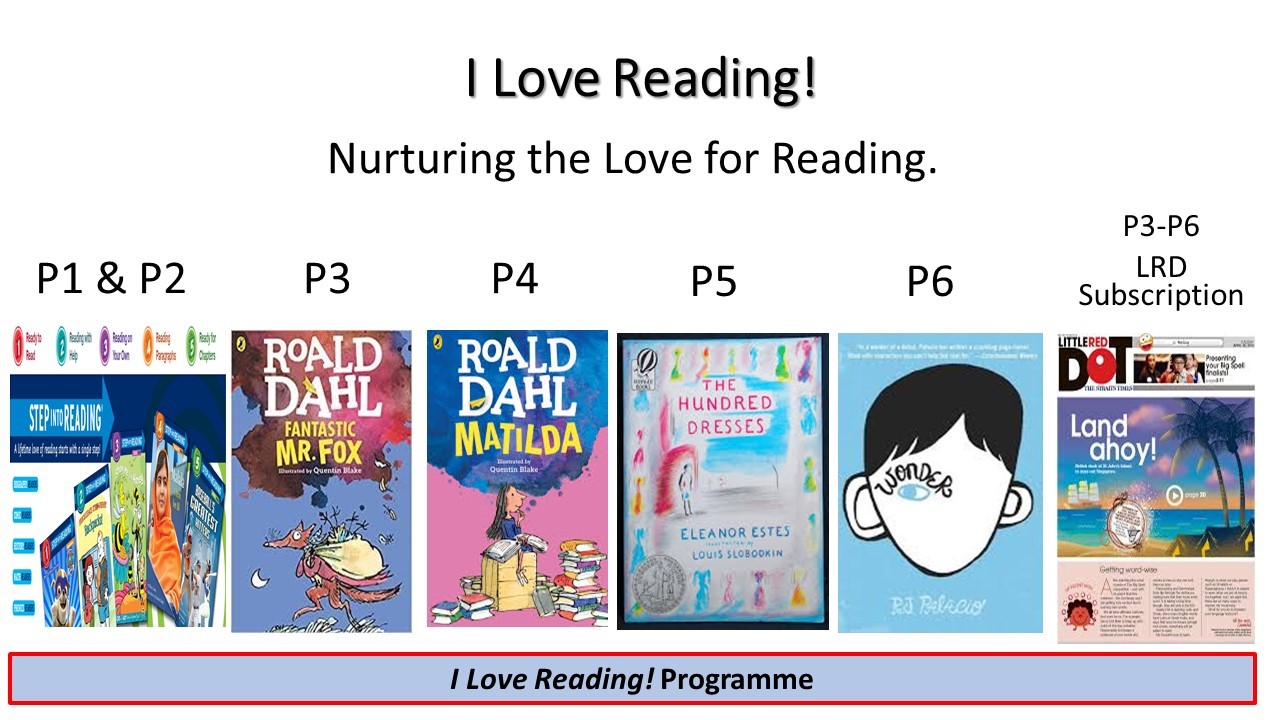
CAPS English Language Signature Programme – The Art of Language

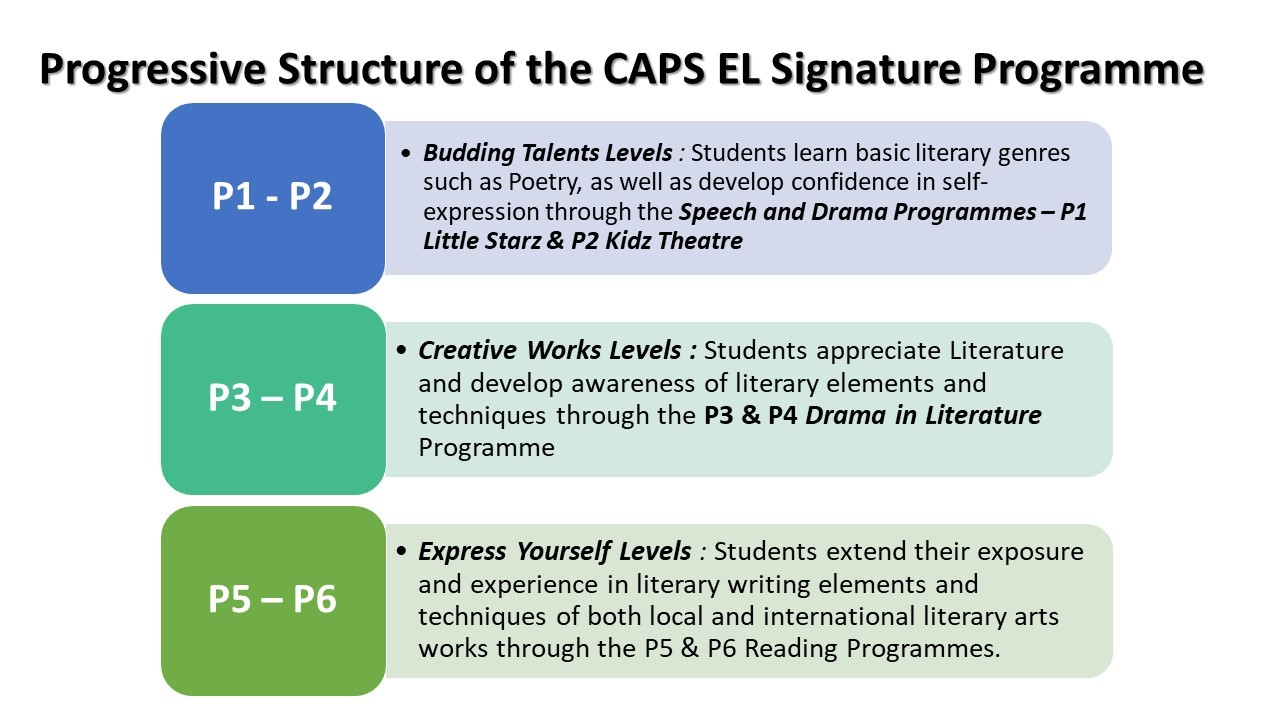






English Language Talent Development Programme (EL TDP)
The aim of the EL TDP is to nurture Casuarinians who excel in English and have demonstrated an aptitude for the language e.g., have a flair for writing, show precocity in reading and possess effective oral communication skills. Students identified for the EL TDP are mentored by teachers to develop their talents in word fluency, writing and speaking. As part of their development, the students are given the opportunity to participate in various school-based and/or national competitions such as the Inter-School National Scrabble Championships (ISNSC), and the Scholastic Environmental Fund (SEF) Oratorical Competition as well as in the School Musicals. Students who display verbal talents will also have the opportunity to take on the role of emcees in school events.


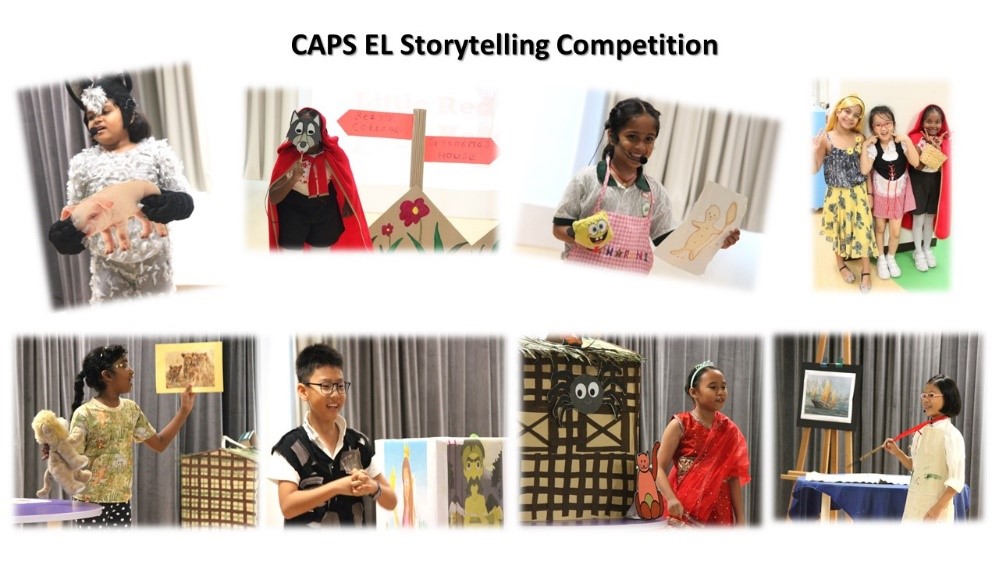
The Stellar Curriculum
STELLAR (STELLAR - Str ategies for English Language Learning And Reading) aims to strengthen both language and reading skills as well as promote a positive attitude towards reading in the foundational years through the use of well-established, learner-centred and developmentally appropriate pedagogical approaches using authentic children’s literature.
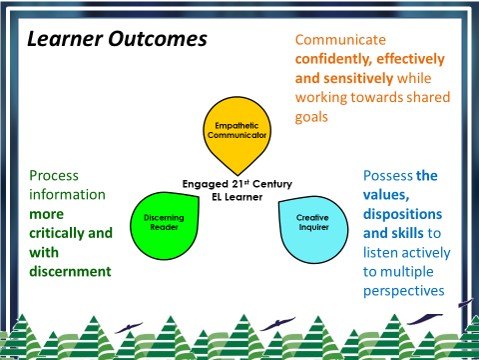
The strategies used for lower primary (Primary 1-3):
- Shared Book Approach (SBA)
- Modified Language Experience Approach (MLEA)
- Differentiated Instruction (DI)
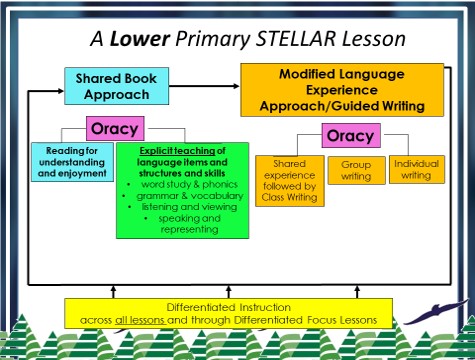
The Shared Book Approach (SBA) is an integrated and balanced language teaching approach that uses motivating and enjoyable “big books” of enlarged print and illustrations or “e-book”.
The Modified Language Experience Approach (MLEA) is an integrated and balanced language teaching approach that uses motivating and enjoyable experiences to extend and exapnd on the language skills learned from the Big Books of SBA.
By Primary 3, most pupils can already handle more independence in reading and writing and the support from the shared reading of Big Books becomes less necessary. Teachers would then use another approach that provides some support, but leads to further independence in reading and learning.
The strategies used for upper Primary (Primary 4-6):
- Supported Reading (SR)
- Know-Want to Know Learnt (KWL)
- Writing Process Cycle
- Differentiated Instruction (DI)
A Supported Reading (SR) lesson hinges on the effective use of Questioning Techniques. Through the use of Questioning Techniques and making predictions, pupils are kept involved, their thinking is stimulated and they acquire critical comprehension strategies.
The Know-Want to Know-Learnt (KWL) strategy focuses on what pupils Know, what pupils Want to know, and what pupils have Learnt. KWL helps learners to approach text independently by teaching them a powerful comprehension strategy. Pupils will learn to connect reading, writing, listening and speaking in an authentic inquiry learning situation.
The Writing Process Cycle involves the processes of planning, writing and reviewing. A series of writing lessons begins with Class Writing followed by Group Writing, and lastly Independent Writing. These processes provide pupils with scaffolding that promotes the acquisition of writing skills in a sequential manner.
Differentiated Instruction (DI) creates a responsive and personalised learning experience for pupils. Teachers guide pupils through activities rather than spend most of the time delivering content. Reading materials are selected according to pupils’ reading levels. Pupils are coached to work in teams to practise collaborative learning and self-directed learning.

